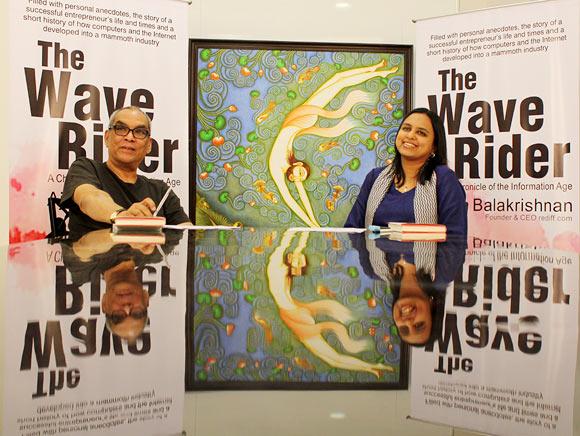 | « Back to article | Print this article |
'India has talent to do world-class work'
CEO of Rediff.com, Ajit Balakrishnan answers some of the questions you asked him here and here.
We'd invited you to pose questions for Ajit Balakrishnan, the CEO of Rediff.com as he discussed the Information Age first with Rashmi Bansal and then with Chetan Bhagat.
He responded to a few select questions. Here are his responses. The users featured here will be intimated by email and will receive an autographed copy of Ajit Balakrishnan's The Wave Rider.
Suresh Menon: Ajit, how do you see the Internet developing in India? The young initiatives in the e-commerce space and the overall activity paint a good picture of a lot of web-enabled services potentially rising on the horizon. But fact is also that large sections of our population are deprived of even electricity let alone the Internet. How and when do you think this gap will be closed as otherwise we cannot call ourselves a front running country in terms of reach of technology? Will your company play a role in this area of ensuring better technology reach as matter of CSR or are you already doing this?
Ajit Balakrishnan: Suresh, I don't believe you need charity (=CSR?) to solve such problems -- ingenious Indians will find a way. For example, we see many, many small shops from very small towns buying things online from our site and then selling it in retail to people in their locality. This ingenious system is leaping over the poor internet penetration in India.
Balan Iyer: Post the Second World War, all the high tech developments happened in USA through the brilliant efforts of the scientists in Bell Laboratories and Massachusetts Institute of Technology, creating a digital revolution like Internet, comps servers, mobile phones etc, making our life worth living! Could India emulate such example in the near or distant future?
Ajit Balakrishnan: Balan, a large, well-funded research programme by the US government as part of its defence efforts provided the impetus for the innovations that led to internet: email, TCP/IP, semiconductors to name a few. I have described this in my book.
Sandeep Atwadkar: Congratulations Mr Ajit Balakrishnan for your book's success. My question is where is India now in the Information Age? Where will it be in the future? What will Rediff's role be in the next 10 years?
Ajit Balakrishnan: Sandeep, Thanks! India has enough young entrepreneurial talent to do world-class work once the broadband penetration issue is settled- that should happen in 2-3 years.
Alok Kumar Chaudhury: What are the opportunities and threats in Information Age?
Ajit Balakrishnan: Alok, the biggest opportunity is to make education, healthcare and delivery of justice affordable for the common man. The biggest threat is that we dismiss it as a fad and miss the opportunity.
You can watch Ajit Balakrishnan in conversation with with Rashmi Bansal here and with Chetan Bhagat here.
Watch The Wave Rider video here!
Please click here to buy your copy of The Wave Rider.
'Information Technology has been both a boon and bane'
Ravi: With information being available by the second for the digitally empowered customer (which is growing in leaps and bounds) how are we (digital media including Rediff) going to capitalise on it? We need to separate the wheat from the chaff and get value by converting the information into some actionable decision...This has a stellar role to play in changing peoples lives for the better.
Ajit Balakrishnan: Ravi, I agree that today's challenge is to extract what is valuable from the tidal wave of data washing over us. Very interesting work is being done in this area all over the world, including here at Rediff.
Shekhar Shridhar: Information Technology has been both a boon and bane for mankind in general and students in particular. Please discuss its effects on mankind in terms of rise in crimes and on students in terms of their addiction to social networking sites, whether it has affected their studies for majority of the students.
Ajit Balakrishnan: Shekhar, I dont believe that spending time on social networking sites affects studies or increases crime. In most cases students get to meet other young people of varied backgrounds and this helps them become socially more adept, an important part of learning
Madhur Kaup: Since you talk about waves , where do u think we are on the curve,as far as Indian IT outsourcing is concerned ?
Ajit Balakrishnan: Madhur, outsourcing has created innumerable jobs in India for young people interested in computer science. While it started out as mere labour arbitrage it has now grown in sophistication and some of our companies are at the leading edge in this area.
You can watch Ajit Balakrishnan in conversation with with Rashmi Bansal here and with Chetan Bhagat here.
Watch The Wave Rider video here!
Please click here to buy your copy of The Wave Rider.

